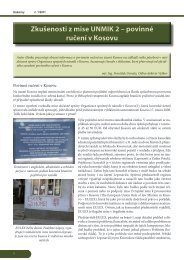TRADOC Pam 525-3-7-01 - TRADOC - U.S. Army
TRADOC Pam 525-3-7-01 - TRADOC - U.S. Army
TRADOC Pam 525-3-7-01 - TRADOC - U.S. Army
- No tags were found...
You also want an ePaper? Increase the reach of your titles
YUMPU automatically turns print PDFs into web optimized ePapers that Google loves.
<strong>TRADOC</strong> <strong>Pam</strong> <strong>525</strong>-3-7-<strong>01</strong>not have kept pace. Efforts to collaborate with other nation’s military in exercises andexperiments will help to expose potential coalition teammates to joint and <strong>Army</strong> concepts forfuture operations.Culture of Nongovernmental AgenciesSupport of indigenous populations in war depends largely on the provision of essential goodsand services. A sheet of plastic to replace a roof destroyed by hostile or friendly fire can beinvaluable. An objectively neutral party willing to accept high risks, even death, may be avaluable means of communication with the people at risk. The International Red Cross is one ofthe oldest such organizations, founded in the late nineteenth century to alleviate suffering bymilitary members of captured opposing forces. 90 In the twentieth century, a wide variety ofhumanitarian organizations sprang up to alleviate all kinds of suffering. These organizations canbecome the battle tourists of the twenty-first century, appearing at the first sign of catastrophe torender aid, often without the means to distribute it on their own, yet determined to maintain theirindependence to decide when and where the need for their assistance exists.Each agency has its own cultural-ethical template and does not necessarily share a commonview of their mission with other agencies. Nongovernmental organizations like the MedècinsSans Frontiéres (doctors without borders) often operate with great moral authority and politicalinfluence in allied nations’ capitals, notwithstanding their efforts to remain neutral. 91 In country,they often rely on military forces for security to do their job. They can compete with militaryorganizations for in-country contract labor. Commanders trying to reestablish social order in anarea of responsibility receive help as deliverers of required services or aid enter the area.Working with some of these humanitarian agencies requires great tact on the part of militaryofficers, and what FM 3-24, refers to as “Hand Shake Con,” informal, situational, and personalagreements, based on mutual trust to do what is promised.External Cultural FactorsMilitary operations are a manifestation of U.S foreign policy. Actions at all levels must beconsistent with national law and norms of conduct while meeting the expectations of theAmerican people, or they are doomed to fail. They must also be consistent with the message theyconvey to world audiences, those favorably disposed and neutral to the American endeavor, andthose hostile. How these divergent audiences will interpret actions is a function of their cultureand the messages they are given. Soldiers at every level must understand that their conduct canhave catastrophic effects on how others perceive the U.S. Soldiers must act within theconstraints of the U.S.’s expectations, even at the cost of accepting greater risk to their lives.British General Rupert Smith had extensive experience dealing with the Global Media inNorthern Ireland, Bosnia, and as Deputy Supreme Allied Commander at Supreme HeadquartersAllied Powers, Europe. He reflects on the relationship between commanders and the press in hisbook, The Utility of Force. His analysis is worth quoting for its absolute importance of the rolethe press plays in modern conflict and the inherent contradiction in commander-press relations. 9275



